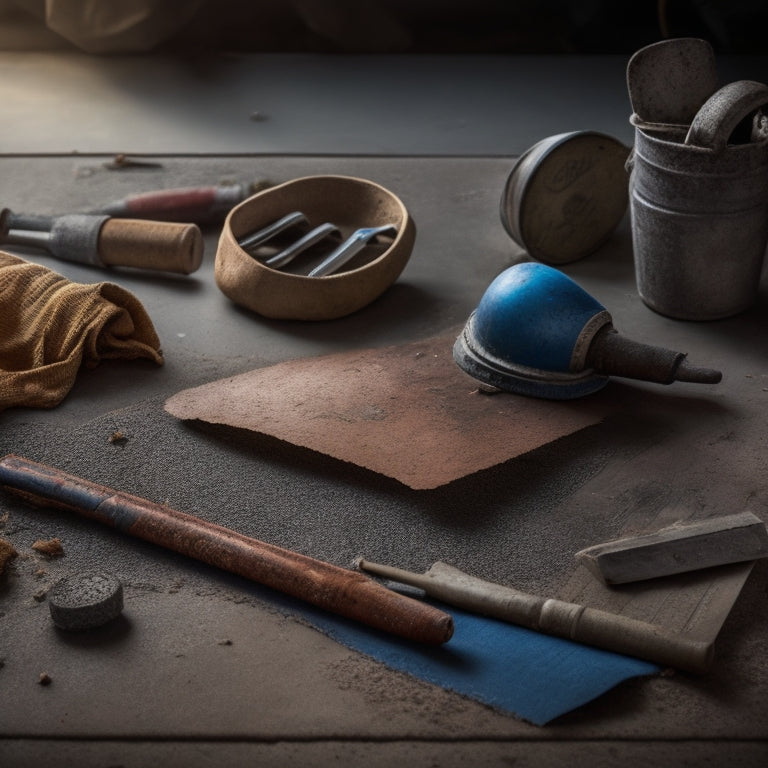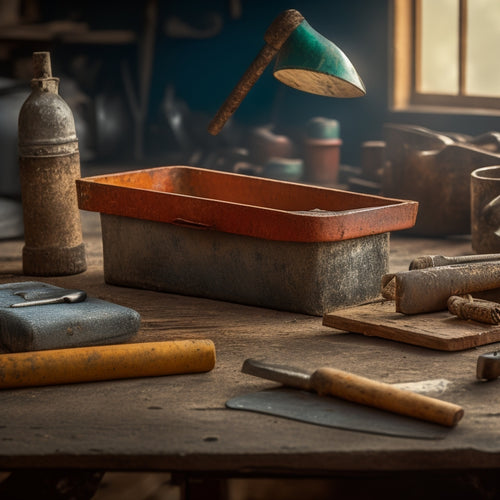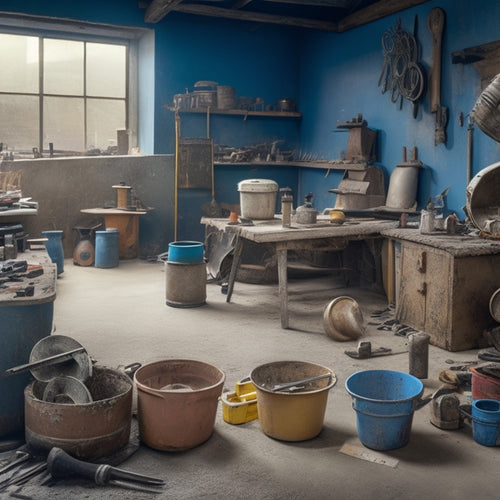
Why Specialized Concrete Tools Break the Bank
Share
You invest in specialized concrete tools because they promise superior performance, precision, and durability, but the hefty price tag often raises eyebrows - and for good reason. High-quality tools with advanced features like sensors and premium materials come at a cost, justifying their elevated prices. Specialized tools are designed to tackle unique tasks, such as concrete profiling or high-torque drilling, and their complexity drives up production costs. Brand reputation, limited production runs, and significant research and development expenses also contribute to the high cost. As you explore the world of specialized concrete tools, you'll uncover more factors that influence their pricing - and discover why the investment may be worth it.
Key Takeaways
• High-quality materials and advanced features in specialized concrete tools increase their prices, justifying higher costs for premium performance and durability.
• Brand reputation, marketing strategies, and exclusive packaging contribute to the luxury perception of high-end concrete tools, influencing customers' willingness to invest.
• Production costs, including labor, overhead, and material expenses, are higher for specialized tools due to smaller production batches, inefficient processes, and reduced bargaining power with suppliers.
• Research and development expenses, competitive analysis, and rigorous testing drive up the prices of sophisticated concrete tools, which are ultimately passed on to consumers.
• Complex design, skilled labor, and quality control processes necessary for advanced tools also contribute to their higher production costs and subsequent prices.
Tool Quality Affects Bottom Line
Using inferior concrete tools can silently drain your profitability, as the added expense of frequent replacements and the loss of productivity they incur can considerably impact your bottom line. You may not even notice the effects, but they're there, eating away at your profits.
High-quality concrete tools, on the other hand, are a worthwhile investment. They offer superior tool longevity, reducing the need for frequent replacements and the costs associated with them. This means you'll save on maintenance costs and minimize downtime, allowing you to focus on the task at hand.
With reliable tools, you can complete projects efficiently, meet deadlines, and ultimately increase your revenue. Don't underestimate the importance of tool quality; it's a vital factor in your business's financial success.
High-Tech Features Increase Cost
As you explore the world of specialized concrete tools, you'll notice that high-tech features come at a price.
Advanced sensors, premium materials, and complex designs all contribute to a higher cost, making it essential to weigh the benefits against your budget.
Advanced Sensors Add Cost
High-tech features like advanced sensors, which can detect even slight variations in concrete properties, drive up the cost of specialized concrete tools. You might think these sensors are a luxury, but they're essential for precision and accuracy.
Sensor technology allows you to monitor concrete's strength, density, and moisture levels in real-time, ensuring your project meets the highest standards. However, this advanced capability comes at a price. The cost benefit of these sensors is undeniable, but it's a significant factor in the overall cost of the tool.
As you consider investing in specialized concrete tools, you need to weigh the benefits of advanced sensors against the added expense. Will the increased accuracy and precision justify the higher cost?
If your project demands the highest quality and you're willing to pay for it, then the answer is yes. But if you're on a tight budget, you might need to compromise on sensor technology or look for more affordable alternatives.
Ultimately, it's up to you to decide whether the cost of advanced sensors is worth the benefits they provide.
Premium Materials Drive Price
You'll also pay a premium for specialized concrete tools built with high-performance materials that can withstand the rigors of heavy-duty use and harsh job site conditions.
These advanced materials are designed to guarantee exceptional material durability, which is critical for concrete tools that are subjected to intense wear and tear.
Manufacturers employ cutting-edge manufacturing processes to craft tools that can resist corrosion, abrasion, and extreme temperatures. For instance, some tools feature titanium or high-strength steel alloys that provide unparalleled strength-to-weight ratios. Others incorporate advanced ceramics or polymers that offer exceptional resistance to chemical corrosion and abrasion.
These premium materials not only enhance tool performance but also extend their lifespan, reducing the need for frequent replacements.
While the upfront cost may seem steep, the long-term benefits of using high-performance materials in specialized concrete tools can lead to significant cost savings and improved productivity over time.
Complex Design Increases Expense
Beyond premium materials, the incorporation of complex design elements and advanced features in specialized concrete tools also drives up their cost. Manufacturers must invest heavily in research, development, and testing to bring these sophisticated products to market.
As you explore the world of specialized concrete tools, you'll find that the design intricacies of these high-tech products come at a price. The more advanced features and functionalities, the more expensive they become.
These design complexities not only increase the cost of production but also have labor implications. Skilled engineers and technicians are required to design and develop these cutting-edge tools, which adds to the overall expense.
Additionally, the testing and quality control processes are more rigorous, involving multiple iterations and simulations to ascertain that the tools meet the required standards.
All these factors contribute to the high cost of specialized concrete tools, making them a significant investment for construction companies and professionals.
However, the benefits of using these advanced tools often outweigh the costs, as they enable you to work more efficiently and effectively, ultimately leading to better project outcomes.
Specialized Tools for Unique Tasks
For tasks that require precision, versatility, or extra muscle, specialized concrete tools are designed to tackle unique challenges that standard equipment can't handle.
You need tools that can adapt to custom tool applications and cater to niche market demands. This is where specialized tools come in, offering solutions for specific tasks that require more than just brute force.
Here are some examples of specialized tools that break the mold:
-
Concrete profiling tools: For creating intricate designs and patterns on concrete surfaces.
-
High-torque drills: For drilling through thick, reinforced concrete with ease.
-
Vibration-reducing trowels: For minimizing vibrations and improving finish quality.
- Ultra-compact mixers: For mixing small batches of concrete in tight spaces.
These tools are designed to address specific pain points in the concrete construction process.
By investing in specialized tools, you can increase efficiency, reduce labor costs, and deliver high-quality results that meet your clients' expectations.
Brand Name and Marketing Impact
When selecting specialized concrete tools, you're not just choosing a product - you're investing in a brand.
You likely consider the perceived quality and reputation associated with a brand name, which can greatly influence your purchasing decision.
As you evaluate your options, it's crucial to examine how a brand's marketing strategy impacts your perception of their products and ultimately, your buying behavior.
High-End Brand Perception
Establishing a high-end brand perception is essential, as it directly influences your customers' willingness to invest in premium specialized concrete tools. A well-crafted brand name and marketing strategy serve as key differentiators in a crowded market.
You want to create a luxury perception that justifies the premium price tag of your tools. This can be achieved by focusing on the finer details that set your brand apart from the competition.
Here are some ways to cultivate brand loyalty and reinforce your high-end brand perception:
-
Exclusive packaging: Use premium materials and sleek designs to create an unboxing experience that feels luxurious.
-
High-quality content: Produce well-researched, informative content that showcases your expertise and attention to detail.
-
Personalized customer service: Offer tailored support that makes customers feel valued and appreciated.
- Strategic partnerships: Collaborate with reputable industry partners to further solidify your brand's reputation.
Marketing Strategy Effectiveness
By carefully crafting your brand name and marketing strategy, you can greatly amplify the perceived value of your premium specialized concrete tools, setting them apart from competitors and justifying their premium price points. A well-designed brand name instantly conveys expertise, quality, and reliability, making it easier to attract high-end clients.
Effective marketing strategies involve identifying and targeting specific market segments that appreciate the unique benefits of your tools. By understanding consumer behavior, you can tailor your messaging to resonate with these segments, creating an emotional connection that drives loyalty and advocacy.
This targeted approach enables you to focus on the most profitable customer groups, maximizing returns on your marketing investments. Additionally, it allows you to differentiate your brand from competitors, establishing a unique market position that commands premium prices.
Limited Production Runs Equal Expense
You'll quickly realize that limited production runs of specialized concrete tools drive up costs due to the economies of scale. As a result, manufacturers struggle to achieve production scalability, ultimately passing the expenses on to you. This is particularly true for niche market tools, where demand is low and production volumes are limited.
Here are 4 key reasons why limited production runs break the bank:
-
Higher unit costs: With smaller production batches, manufacturers can't take advantage of bulk material discounts, leading to higher unit costs.
-
Inefficient production processes: Limited production runs often require more manual labor, increasing labor costs and reducing production efficiency.
-
Higher overhead costs: Manufacturers must still cover overhead expenses, such as equipment maintenance and facility costs, even with smaller production runs.
- Reduced bargaining power: With lower production volumes, manufacturers have less negotiating power with suppliers, resulting in higher material costs.
These factors contribute to the high costs of specialized concrete tools, making them a significant investment for your business.
Research and Development Costs
Developing specialized concrete tools requires a significant investment in research and development, which drives up costs as manufacturers must recoup these expenses through higher product prices.
You're probably aware that innovation cycles in the concrete tool industry are relatively long, often taking years to develop and perfect new products. This prolonged process means manufacturers must dedicate substantial resources to R&D, including salaries for engineers, materials, and testing facilities.
To stay ahead of the competition, you need to conduct thorough competitive analysis, identifying areas where your tools can outperform existing products. This, in turn, requires additional investments in market research, customer feedback analysis, and product testing.
As a result, the costs of R&D are substantial, and manufacturers have no choice but to pass them on to you, the consumer, in the form of higher prices for specialized concrete tools.
Frequently Asked Questions
Can I Use General Tools for Specialized Concrete Tasks?
You might think you can get away with using general tools for specialized concrete tasks, but think again.
Those general tools have limitations that'll hold you back. They're not designed to meet the specific requirements of specialized tasks, like high-torque drilling or precise edging.
You'll struggle with subpar results and wasted time.
Invest in the right tools for the job – your concrete projects demand it.
Are Expensive Concrete Tools Worth the Investment?
You're wondering if expensive concrete tools are worth the investment, and the answer is yes.
It's like comparing a Ferrari to a bike - both get you where you want to go, but one is built for speed and precision.
In the long run, specialized tools offer long-term savings by reducing waste and rework. They also provide quality assurance, ensuring your projects meet the highest standards.
Don't compromise on quality; invest in the best tools for a superior outcome.
Can I Rent Specialized Concrete Tools Instead of Buying?
You're considering renting specialized concrete tools instead of buying, and that's a smart move.
Renting offers significant tool rental benefits, including reduced upfront costs and minimized storage needs. This cost-saving strategy allows you to access high-end equipment without the hefty price tag.
Plus, you'll avoid maintenance and repair expenses, freeing up resources for other project priorities.
Do Cheaper Alternatives to Specialized Tools Exist?
When searching for budget-friendly options, you'll find cheaper alternatives to specialized concrete tools.
However, it's essential to compare tool performance before making a decision.
You might find that a lower-priced option sacrifices durability or precision, ultimately costing you more in the long run.
Weigh the pros and cons, considering your project's specific demands and your own expertise.
Are There Any Discounts for Bulk Orders of Specialized Tools?
You're used to getting what you pay for, but when it comes to specialized concrete tools, you're willing to splurge for high-quality quality.
Now, you're wondering if you can score some bulk order discounts to soften the blow.
The answer is yes, many manufacturers offer significant specialized tool savings for bulk orders.
You can negotiate with suppliers or look for online retailers that offer discounts for large quantities, helping you get the best tools without breaking the bank.
Conclusion
As you calculate the cost of your next concrete project, remember that specialized tools come with a hefty price tag.
It's not just the sticker shock - high-quality tools with advanced features, unique designs, and reputable brand names all contribute to the expense.
Limited production runs and research costs also drive up prices.
The truth is, these tools are an investment in your project's success, but be prepared to break out your wallet.
The final tally will be a reflection of the quality you're willing to pay for.
Related Posts
-

Smart Guide to Buying Used Concrete Hand Tools
You're about to buy used concrete hand tools, and you need to get it right. Dedicate time to identify the tools you n...
-

Essential Tools for Concrete Wall Covering Projects
When tackling a concrete wall covering project, you'll need a range of essential tools and equipment. For cleaning an...
-

Best Tools for Concrete Restoration and Repair
When tackling concrete restoration and repair projects, you need a range of reliable tools to achieve professional-gr...


